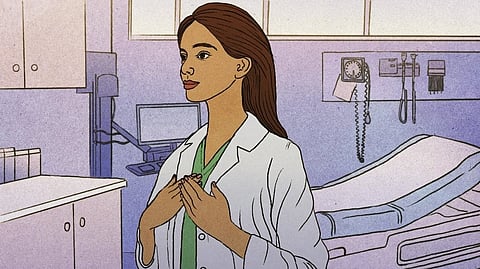How a daily gratitude practice can change your life and work
The first thing Alison C. Jones does each morning is name three things she’s grateful for. They might be as small as the breeze from a fan or as deeply personal as the emotional support of a friend.
Jones, an organisational development consultant and single mother, credits this simple ritual for helping her navigate uncertainty—especially while building a business. “When you practise gratitude, you train your brain to look for the positive. You start to see the lessons in the pain,” she says.
Gratitude, both in and out of the workplace, has been shown to boost morale, increase resilience and create a stronger sense of connection. Yet despite the benefits, it’s often undervalued in professional settings.
Starting small
Experts suggest that building a gratitude habit doesn’t need to be overwhelming. Jones’s own routine is intentionally simple: she avoids repeating herself and challenges her mind to find new things to appreciate each day.
She also recommends finding a “gratitude buddy” with whom to exchange reflections—via text, email or conversation. Some people keep a journal, while others prefer voice notes or messages. The point is consistency and intentionality.
Bringing it to the workplace
Peter Bonanno, a consultant who develops mindfulness programmes for companies, says gratitude can be a game-changer in professional environments. “We’re often wired to focus on problems,” he explains. “Gratitude can shift that bias in a powerful way.”
Something as straightforward as a manager beginning a team meeting by acknowledging recent wins can positively influence team dynamics.
Organisations like the O.C. Tanner Institute have designed systems that embed appreciation into corporate culture. Their solutions include handwritten thank-you notes, milestone celebration boxes, and even points-based recognition systems—like the one implemented at American Airlines—where colleagues can reward each other and redeem tokens for gifts.
“It’s not just about perks,” says Meghan Stettler, director at the institute. “Recognition strengthens people’s sense of purpose.”
Some companies also choose to thank front-line workers with donations, from snacks and personal care items to gift boxes.
Jason Lalak of Frontline Builders, a non-profit founded during the pandemic, notes that appreciation doesn’t need to be extravagant. “Gratitude doesn’t cost anything—but it’s surprisingly rare,” he says.
Finding support in difficult times
During the height of the pandemic, Denver Health’s corridors became eerily quiet. With visits restricted, patients were often alone. When local communities dropped off snacks or handmade cards, the gesture resonated deeply with staff like nurse Denise Wittsell.
“It felt like we were being held emotionally,” she recalls.
Wittsell now volunteers with RESTORE, a peer-support programme at the hospital that offers round-the-clock emotional aid to healthcare workers. Staff can reach out after traumatic events, and volunteers provide tools from psychological first aid to help colleagues calm their nervous systems and regain balance.
“We’re not doing therapy, but we’re creating a safe, understanding space,” says programme director Tia Henry. “That, in itself, is an act of gratitude.”
Beyond thank yous
In Indianapolis, the Indy Public Safety Foundation goes a step further—offering frontline workers both symbolic and practical support. In addition to hosting award ceremonies and showing up after community crises with food and encouragement, they’ve also donated equipment like electric bikes for police patrols.
Its president and CEO Dane Nutty points out that while public gratitude surged during the pandemic, it has waned even as challenges persist. “Their work hasn’t become any easier,” he says.
Still, gratitude alone isn’t a solution for deeper workplace issues. Jones stresses that being thankful shouldn’t prevent anyone from advocating for fair conditions. “Gratitude isn’t passivity,” she says. “You can be thankful and still ask for better.”
Ultimately, incorporating gratitude into daily life—whether through quiet reflection or shared recognition—can be a small, steady force for positive change.
For more updates, join/follow our WhatsApp, Telegram and YouTube channels.

